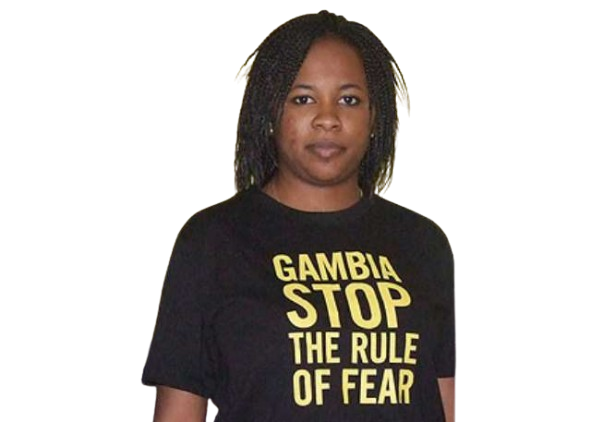Gambiaj.com – (BANJUL, The Gambia) – In the dark years of dictatorship in The Gambia, when many chose silence, Ndey Tapha Sosseh chose resistance. A journalist by training, a leader by instinct, and an activist by necessity, Sosseh’s legacy is etched into the soul of a country that once stood at the edge of tyranny.
Born in 1979 in Banjul and raised between Bakau, Fajara, and Kanifing, Sosseh was rooted in the everyday struggles of Gambians. These formative years inspired in her a lifelong mission: to uplift the unheard, especially women from the country’s rural margins.
A Young Journalist with a Big Voice
Sosseh’s professional journey began in 1998 as a cub reporter at The Daily Observer, one of Gambia’s major newspapers. But she was no ordinary rookie.
Within a year, she founded the “Women in Development” column—an ambitious effort to tell the stories of women far removed from the capital’s power centers.
She journeyed deep into The Gambia’s remote areas, often using her own modest resources to give visibility to the invisible. Her then-editor jokingly called her “an uppity cub,” but that “uppity” resolve would become her defining trait.
For Sosseh, journalism was never just a job—it was a moral calling. “I had this innate urge to give a platform, a voice to the Gambian women … who would not be seen, heard, or invited to the discussion table,” she later reflected.
Breaking Barriers in the Newsroom
After postgraduate studies in the United Kingdom, including a master’s in international journalism, Sosseh returned home in 2004 and broke the glass ceiling: she became the first female editor-in-chief of a daily Gambian newspaper.
Though her tenure at The Daily Observer was short-lived, it was a landmark for gender equality in the Gambian press.
As political repression under President Yahya Jammeh deepened, Sosseh took her fight beyond the newsroom. In 2005, she was elected secretary general of the Gambia Press Union (GPU), rising to the presidency in 2008.
Her leadership came at a time when journalism had become a dangerous profession in The Gambia—one marked by intimidation, arbitrary arrests, torture, and even murder.
Defying Dictator Jammeh Cost Her Exile, but Not Silence
The turning point came in the aftermath of the December 2004 assassination of journalist Deyda Hydara. Sosseh’s outspoken demand for justice for Hydara—and her persistent public criticisms of the regime—drew the ire of Jammeh’s government.
Eventually, her refusal to be silenced cost her the editorship of The Daily Observer, but it amplified her moral authority as a union leader and press freedom advocate.
By 2009, the threats had become too dangerous to ignore. She fled into exile in Bamako, Mali, relying on her dual citizenship through marriage to seek safety.
While there, the regime charged her with treason for her involvement with the Coalition for Change group, even launching failed attempts to extradite her. The International Federation of Journalists intervened to provide round-the-clock security as she continued her advocacy from abroad.
In exile, Sosseh’s voice only grew louder. Through her work with the West African Journalists Association (WAJA), she amplified the plight of Gambian journalists and used international platforms to demand reforms. Her courage made her both a symbol and a strategist of resistance.
Even when Jammeh’s agents sought to silence her, Sosseh fought back with legal acumen and strategic communication.
She penned open letters to the dictator, denounced state repression, and became a lifeline for journalists back home.
Reconciliation and Reform: Legacy of a Freedom Fighter
With the fall of Yahya Jammeh in 2016 and the ushering in of democratic reforms under President Adama Barrow, Sosseh returned home in October 2017.
Her return was not just symbolic—it was part of a national healing process. She became a special advisor to the Minister of Information and Communications, helping shape new policies rooted in transparency and accountability.
In July 2019, she testified before the Truth, Reconciliation, and Reparations Commission (TRRC), detailing the climate of fear, censorship, and violence journalists endured under Jammeh’s regime.
Her words helped immortalize the pain and perseverance of Gambian media workers during one of the nation’s darkest chapters.
Today, Ndey Tapha Sosseh stands as one of The Gambia’s most enduring champions of free speech, gender equality, and democratic reform. From the halls of journalism to the corridors of public service, her life has been a continuous act of defiance against oppression.
She is not just a survivor of dictatorship—she is one of the architects of Gambia’s democratic reawakening.
As she said on World Press Freedom Day in 2023, “All other rights are intrinsically linked to the right to express oneself … I had this innate urge to give a platform … to the many rural women … who remained unnoticed and marginalized.”
That single quote captures the essence of her life’s work: journalism not as a career, but as a tool for justice, visibility, and liberation.











One Response
Ndey Tapha is an extraordinary woman whose impact has uplifted many—especially young women. She was the first person to believe in my potential, offering me an opportunity and compensating me generously for my writing. Her unwavering commitment to empowering others, particularly women, reflects her understanding that shining a light on others does not diminish your own. She remains one of my most inspiring role models.